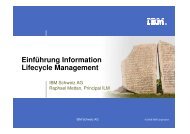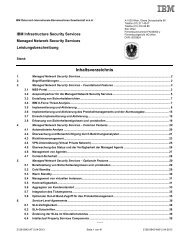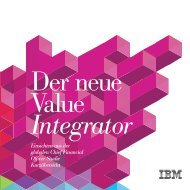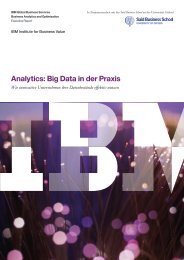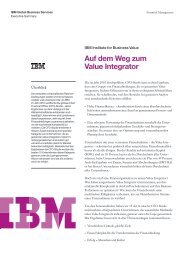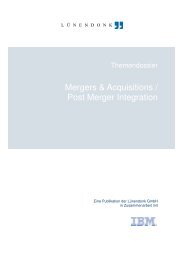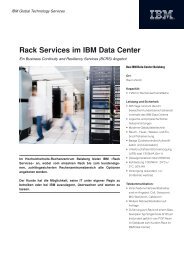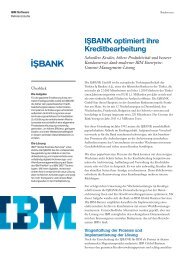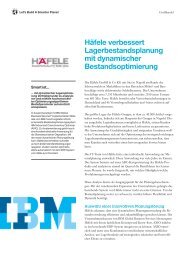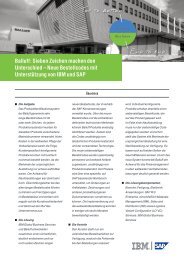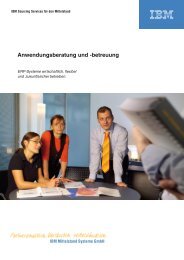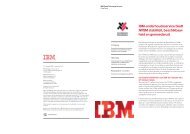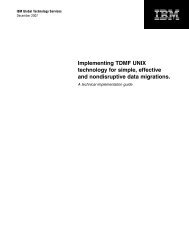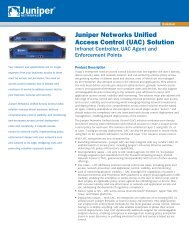Trends and Innovations Shaping the Future of Banking 2.0 - IBM
Trends and Innovations Shaping the Future of Banking 2.0 - IBM
Trends and Innovations Shaping the Future of Banking 2.0 - IBM
Create successful ePaper yourself
Turn your PDF publications into a flip-book with our unique Google optimized e-Paper software.
trends And innovAtions shAping <strong>the</strong> <strong>Future</strong> oF BAnKing <strong>2.0</strong><br />
“What is <strong>the</strong> relevance<br />
today <strong>of</strong> <strong>the</strong> customer<br />
experience <strong>and</strong> our<br />
ability to influence that<br />
end-to-end?”<br />
– Graham Kittle, <strong>IBM</strong><br />
Global Business Services<br />
2<br />
America <strong>and</strong> <strong>the</strong> Recording Industry Association <strong>of</strong><br />
America were initially confronted with a modality<br />
shift <strong>the</strong>ir reaction was to try <strong>and</strong> stop it happening.<br />
They went after Napster <strong>and</strong> file sharing sites but<br />
that didn’t stop people changing <strong>the</strong>ir behaviour.<br />
When a legitimately better process came along<br />
it was rapidly adopted <strong>and</strong> worked well. When<br />
changes in modality occur, those that resist <strong>the</strong><br />
change don’t fare well <strong>and</strong> <strong>the</strong> change happens<br />
anyhow. Bankers now realise that things are going<br />
to be different moving forward. The financial crisis<br />
may have actually helped us. Without an impetus<br />
to change internally within <strong>the</strong> sector it’s likely that<br />
organisations like Google, Apple, PayPal, Square<br />
<strong>and</strong> M-PESA in Kenya will dominate <strong>the</strong> customer<br />
experience. If that happens, we may still have a few<br />
bank branches but <strong>the</strong>y will no longer service <strong>the</strong><br />
dominant behaviour, which will be owned by new<br />
market participants.<br />
The knee-jerk reaction is that this won’t happen<br />
with banking because <strong>the</strong> regulators won’t allow<br />
it. I disagree. In Australia, which prides itself on<br />
being at <strong>the</strong> forefront <strong>of</strong> banking technology, <strong>the</strong><br />
regulators can’t afford to let banks slip behind how<br />
customers access banking services. The regulators’<br />
role is not to stop innovation, but to protect <strong>the</strong><br />
market. Take Google Wallet – <strong>the</strong> regulators are<br />
not going to say this is a risk to <strong>the</strong> banking sector<br />
in Australia. They are likely to see it as inevitable<br />
<strong>and</strong> determine how Australian banks can play in<br />
<strong>the</strong> mobile payments ecosystem, how to support<br />
contactless point <strong>of</strong> sales <strong>and</strong> how to h<strong>and</strong>le Google<br />
or Square in <strong>the</strong> market. They may encourage <strong>the</strong><br />
incumbent players to work out a mobile payment<br />
solution <strong>the</strong>mselves <strong>and</strong> partner with Telstra <strong>and</strong><br />
with EFTPOS, BPAY <strong>and</strong> PayPal.<br />
When new paradigms come out, everyone initially<br />
wants to own <strong>the</strong> space, but with modality you can’t.<br />
Mobile banking is already a mainstream contender<br />
in Australia. St George recently reported that <strong>the</strong>ir<br />
daily mobile transactions are <strong>the</strong> equivalent <strong>of</strong><br />
<strong>the</strong>ir top forty branches. Take mobile banking as<br />
an example; no-one owns that space, although if<br />
you want your customers to have access to mobile<br />
banking you might have to ask Google <strong>and</strong> Apple<br />
for permission to use <strong>the</strong>ir app stores today. So who<br />
owns <strong>the</strong> customer?<br />
Disintermediation, this separation between <strong>the</strong><br />
manufacturing, risk management <strong>and</strong> distribution<br />
<strong>of</strong> products, is already starting. There are many<br />
new entrants in <strong>the</strong> retail financial services space<br />
<strong>and</strong> it’s not realistic to try <strong>and</strong> stop that happening.<br />
The approach should be a strategy for open<br />
partnerships to maximise reach to customers <strong>and</strong><br />
provide products in <strong>the</strong> easiest, most seamless,<br />
most relevant, contextual manner possible.<br />
In <strong>the</strong> future, <strong>the</strong> value <strong>of</strong> <strong>the</strong> bank will be about<br />
how useful <strong>and</strong> relevant <strong>the</strong> bank is in day-to-day<br />
interactions. Take mobile payments. The sexy thing<br />
about mobile payments is not that I use my phone<br />
as a credit card at <strong>the</strong> point <strong>of</strong> sale; it’s that before<br />
I make <strong>the</strong> payment, I can see my account balance.<br />
When I make <strong>the</strong> payment, I immediately see a<br />
newly adjusted balance on <strong>the</strong> screen. The number<br />
one call to retail banks in Australia is still, “What’s<br />
my account balance?” If you combine that with a<br />
payment capability, say a mobile wallet, that will<br />
change your relationship with <strong>the</strong> bank. Day-today<br />
I now know what’s happening with my money.<br />
That’s very powerful. You can’t do that with a piece<br />
<strong>of</strong> plastic or a cheque book.<br />
There are many contextual opportunities that<br />
feed <strong>of</strong>f this. For example, if I go to Harvey Norman<br />
to buy a flat-screen TV for $1,000 my phone might<br />
show that if I buy it I will default on my mortgage<br />
payment in 3 days time; or if I’m about to use a<br />
competitor’s card <strong>the</strong> bank might <strong>of</strong>fer an interestfree<br />
line <strong>of</strong> credit if I use <strong>the</strong>ir facility.<br />
With Google Wallet, Google is not trying to<br />
enter <strong>the</strong> payments business. Google is entering<br />
<strong>the</strong> advertising messaging business surrounding<br />
payments. They’re giving away contactless point <strong>of</strong><br />
sale terminals for free to retailers. They underst<strong>and</strong><br />
that payment is contextual <strong>and</strong> <strong>the</strong>y can give you a<br />
message to change your behaviour. Their business<br />
model is charging for that messaging architecture.<br />
Banks need to think about <strong>the</strong>ir context in a<br />
person’s life. It’s no longer about providing a personal<br />
loan, a mortgage or a credit card. <strong>Banking</strong> doesn’t<br />
work like that any more. <strong>Banking</strong> is now about <strong>the</strong><br />
different touch points where a customer can utilise<br />
banking to make life easier with <strong>the</strong> least friction<br />
possible. This is not intuitive because friction is built<br />
in to policy, process, Know Your Customer (KYC),<br />
risk management <strong>and</strong> so on. We’ve got to get rid <strong>of</strong><br />
this friction to enable customer behaviour in a more<br />
seamless way. People gravitate towards simplicity.<br />
If I can get my balance as I’m making a payment,<br />
that’s a lot simpler than having to ring up <strong>the</strong> bank.<br />
Simplicity is what we should be aiming for, but we<br />
can’t do that on our own. It has to be based on an<br />
open platform <strong>and</strong> dealing with partners.<br />
grAhAm Kittle, iBm: The scenario that you’ve<br />
painted suggests that a bank’s ability to own<br />
<strong>the</strong> front-end customer experience is becoming<br />
undone. What is <strong>the</strong> relevance today <strong>of</strong> <strong>the</strong><br />
customer experience <strong>and</strong> our ability to influence<br />
that end-to-end?<br />
Brett King, Author: There will still be trusted<br />
br<strong>and</strong>s; when it comes to ensuring our money is<br />
safe we’ll underst<strong>and</strong> a bank needs to be involved.<br />
However, we’ll be a lot more opportunistic in respect<br />
to products <strong>and</strong> service. Loyalty will be much<br />
tougher because people will trade-<strong>of</strong>f between<br />
convenience <strong>and</strong> br<strong>and</strong>. For years convenience<br />
has been <strong>the</strong> driver for deciding on a new branch<br />
location, but convenience in <strong>the</strong> mobile/social<br />
space will be about providing a product here <strong>and</strong><br />
now that is relevant to me. Consider this: I don’t buy<br />
a mortgage – I buy a home; I don’t get a personal



